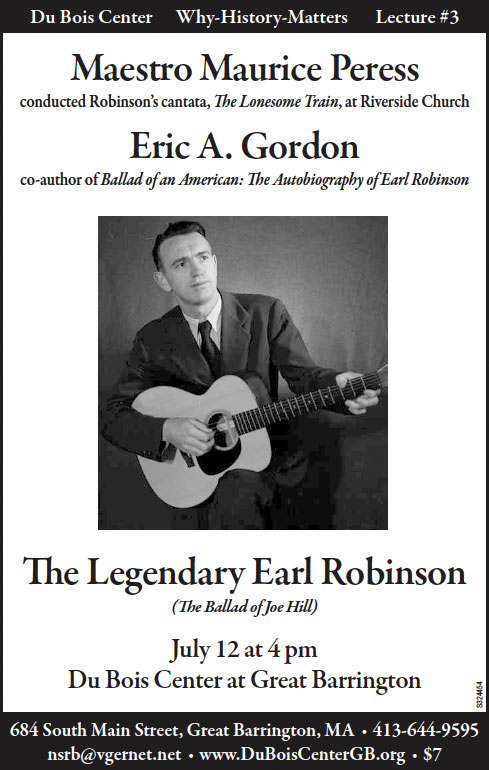Come and Go with Me
 GREAT BARINGTON—Earl Robinson wrote folk songs—protest songs and freedom songs. He lamented Lincoln’s death and celebrated the end of segregation. And stars sang his music.
GREAT BARINGTON—Earl Robinson wrote folk songs—protest songs and freedom songs. He lamented Lincoln’s death and celebrated the end of segregation. And stars sang his music.
Robinson’s ‘Ballad for Americans’ became Paul Robeson’s signature song. Actor, writer, singer, lawyer and activist, Robeson played ‘Othello’ on Broadway and made spirituals familiar music in the United States before the Civil Rights movement.
Joan Baez recorded Robinson’s setting of “Joe Hill,” and Three Dog Night recorded “Black and White,” a tune Robinson co-wrote to celebrate the court decision that opened the schools.
On Sunday at 4 p.m., maestro Maurice Peress and writer Eric A. Gordon will pay tribute to “The Legendary Earl Robinson” at the W.E.B. Du Bois center at 684 South Main St.
Peress served as assistant conductor under Leonard Bernstein in the 1960s. He has since led orchestras from Shanghai to Melbourne to Rome. A professor at the Aaron Copland School of Music, he worked with Duke Ellington to revise his “Black, Brown, and Beige” and published “Dvorak to Duke Ellington: A Conductor Explores America’s Music and Its African American Roots.”
This year, Peress conducted Earl Robinson’s cantata for Abraham Lincoln, “The Lonesome Train,” at the Riverside Church in Manhattan, and his performance filled the hall.
A graduate of Yale University and Tulane University, Gordon worked with with Earl Robinson to write Ballad of an American: The Autobiography of Earl Robinson.
“The Legendary Earl Robinson” is the third in the DB Center’s lecture series.

